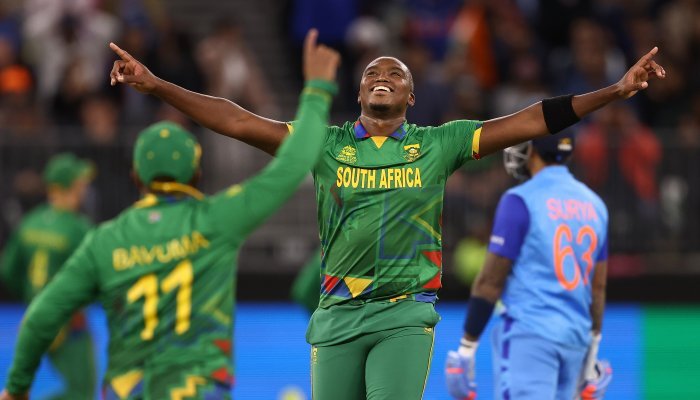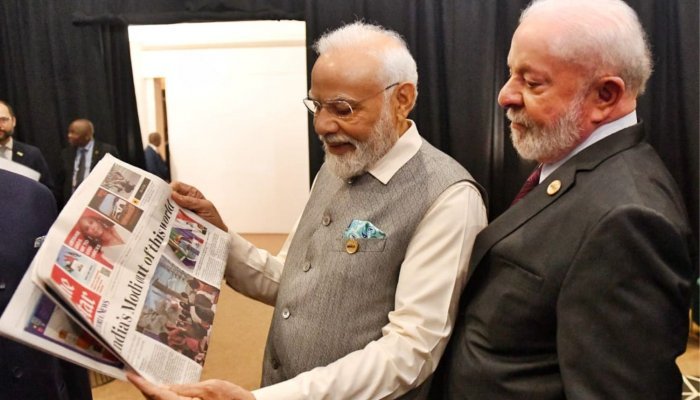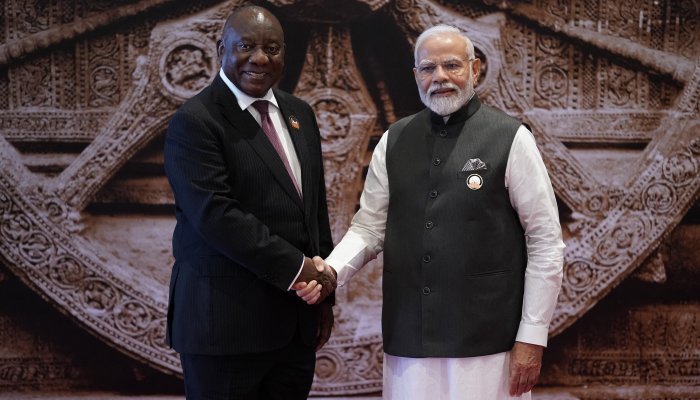President Cyril Ramaphosa made his first state visit to India in 2019, accompanied by the first lady, Dr. Tshepo Motsepe, a selection of cabinet ministers, senior government officials, and a large business delegation. He was just approaching the one-year mark since being inaugurated, and given South Africa and India’s centuries-long relationship, was named the chief guest at India’s 70th Republic Day Parade on 26 January of that year.
During this trip, Ramaphosa also delivered the inaugural India-Brazil-South Africa Gandhi Mandela Freedom Lecture.
He started off the speech by acknowledging the “close political, cultural, trade and strategic ties” shared by the two countries. “We can be proud of the road our two countries have traversed,” he noted. “Two sister countries separated by an ocean, but bound by history, by the collective energies of our people, and by the deep friendship and respect we hold for each other.”
Ramaphosa praised both countries for advances made in addressing respective challenges of underdevelopment, and economic and political marginalisation, and issued a reminder that there was still more work to be done.
“Through our cooperation on a range of platforms such as Brics [Brazil, Russia, India, China and South Africa], IBSA [India, Brazil, South Africa Forum], the Indian Ocean Rim Association, the G20, the G77 plus China and the Non-Aligned Movement, we will continue to work together in pursuit of a world free of poverty. As like-minded emerging economies we recognise that we have a collective role to play in addressing and correcting the imbalances in the global economy.”
A couple of weeks later, further steps were taken in this direction, with the Outward Trade and Investment Mission to New Delhi and Mumbai, which took place from 4-8 March 2019. The purpose of the mission was to increase the trade of value-added goods and investment between South Africa and India. The trip contributed to maintaining the momentum sparked by President Ramaphosa’s state visit.
A united future
The Republic of India and the Republic of South Africa re-established diplomatic relations in 1993, following the dismantling of the apartheid regime. Since then, commercial relations between the two have grown.
India is currently South Africa’s fourth-largest import partner and seventh-largest export partner. These partnerships span from economic and commercial cooperation to defence, culture, health, human settlements, public administration, science and technology, and education.
According to the Observatory of Economic Complexity, during the last quarter-century, South Africa's exports to India have increased at a yearly average of 13.9%, from $273 million in 1995 to $9.14 billion in 2022, while the exports of India to South Africa have increased at an annualised rate of 13%, from $304 million in 1995 to $8.32 billion in 2022. In 2022, South Africa exported $9.14 billion to India, with the main products being gold, coal briquettes, and raw copper. That same year, India exported $8.32 billion to South Africa. The main products were refined petroleum, cars, and packaged medicaments.
Held in Johannesburg in August 2023, the 15th Brics Summit was a welcome opportunity to recognise all the significant trade and agreements that have taken place between the nations, and also a chance to forge new deals and collaborations.
During his remarks at the gathering, Indian Prime Minister Shri Narendra Modi shared suggestions for further broadening the close cooperation between Brics countries. He highlighted some of the initiatives that could be implemented in countries such as South Africa. “In India, we have created Diksha, i.e., the Digital Infrastructure for Knowledge Sharing platform, to provide education to the children of remote and rural areas. Also, to promote innovation among school students, we have created 10 000 Atal tinkering labs across the country. Public service delivery is being revolutionised through digital public infrastructure such as India Stack.”
Other possibilities for collaboration include the Open Network for Digital Commerce, which is a private non-profit company established by India’s Department for Promotion of Industry and Internal Trade to develop open and democratic e-commerce.
India also has extensive experience in business process outsourcing and in knowledge process outsourcing. Recent advances in product creation through global capability centres could also provide beneficial learnings and applications for South Africa.
Both the governments of India and South Africa recognise the substantial potential for further trade growth between the two countries.
Three areas of collaboration
The Centre for African Studies has highlighted three areas in which collaboration could benefit both economies. It listed healthcare and pharmaceuticals, climate change and sustainability, and cultural/educational exchanges. “Both countries possess strengths in the pharmaceutical sector and medical research. Collaborative efforts in healthcare technology, pharmaceutical production, and research can address public health challenges and contribute to global health security,” the centre noted.
When it comes to the environment, the geographic positioning of both countries means they are facing the devastating impact of climate change, but they can work together to mitigate some of the effects and to transition to more sustainable economies. “Sharing best practices, technology transfer, and joint research initiatives can drive innovation in renewable energy, resource management, and environmental protection.”
Thirdly, the centre suggests strengthening cultural ties and promoting educational exchanges to foster a more profound understanding between the two nations.
Significant strides have been made in the past few years, with large Indian companies establishing a presence in various sectors of the South African economy, and South African companies similarly making inroads in India. An Indian giant with South African roots is creative consulting organisation Nihilent, which is the first South African-owned company with headquarters in India.
On the sporting front, cricket is a demonstration of a great relationship between India and South Africa. South African players are drafted in India, while a lot of South African technology is used in Indian cricket as well as coaches and physios working with Indian players. Additionally there are Indian franchises that own SA T20 teams. All this is an example of what could occur in other sectors.
When it comes to skills development, one of the flagship initiatives of bilateral cooperation is the KhulaSangam Programme. An initiative of the FirstRand Foundation, the programme takes unemployed IT graduates from South Africa to India on a six-month internship programme, exposing them to Indian business and community development. This international experience can be an important contributor to bridging the gap between tertiary education and employability.
Building blocks to success
Some of the recent agreements and initiatives between South Africa and India
June 2022: Prime Minister Modi met President Ramaphosa on the sidelines of the G7 Summit in Germany. They expressed satisfaction at the progress achieved in the defence, education, and agriculture sectors. Additional sectors in which bilateral cooperation could be deepened were identified as food security, defence, pharmaceuticals, and digital financial inclusion. Discussions were also held on continued coordination in multilateral bodies and the need for their reform, particularly the UN Security Council.
August 2022: The 11th Session of India-South Africa Foreign Office Consultations was held in New Delhi, and co-chaired by representatives from both offices. Both sides reviewed the entire spectrum of bilateral relations such as political exchanges, consular matters, and human resource development. They also each reviewed the status of memoranda of understanding (MOUs) and agreements under negotiation and agreed to expedite their finalisation for the mutual benefit of both countries.
October 2022: A South African defence delegation led by the Minister of Defence and Military Veterans, Thandi Ruth Modise, visited India in connection with DefExpo 2022. On the sidelines of this gathering, the delegation also attended the India-Africa Defence Dialogue on 18 October and the Indian Ocean Region Defence Ministers’ Conclave on 19 October.
January 2023: An MOU on Cooperation in the Reintroduction of Cheetah in India was signed. It facilitates cooperation between the two countries to establish a viable and secure cheetah population in India. A first batch of 12 cheetahs (seven males and five females) was translocated from South Africa to India on 18 February 2023. In terms of the agreement, the countries will collaborate and exchange best practices in large carnivore conservation through the transfer of technology, training of professionals in management, policy, and science, and to establish a bilateral custodianship arrangement for cheetah translocated between the two countries. The terms of the MOU will be reviewed every five years to ensure continued relevance and utility.
February 2023: A 10-member delegation from the South African parliamentary standing committee on public accounts (Scopa) visited India to undertake a study tour. That same month, a six-member delegation of the human settlements portfolio committee of the Gauteng legislature visited Delhi for an international study tour from 23-27 February 2023; the visit was facilitated by the UN-Habitat country office in India.
July 2023: Dr. Rajkumar Ranjan Singh, the Indian Minister of State for Education and External Affairs, visited South Africa to participate in the 10th meeting of Brics ministers of education in Mpumalanga. Another delegation led by Meenakashi Lekhi, the Indian Minister of State for Culture, visited Mpumalanga from 19-22 July 2023 to attend the Brics ministers of culture meeting and senior officials meeting. During her visit, Lekhi also participated in a yoga event and a community event in Johannesburg.
Directions of trade
From India to South Africa
Exports from India to South Africa include: petrochemicals and fuel, drugs and pharmaceuticals, vehicles and components, transport equipment, engineering goods, footwear, dyes and intermediates, chemicals, textiles, rice, gems and jewellery, and sports goods. Distillate fuel is the largest Indian export to South Africa.
Companies in South Africa include: Tata, Sun Pharmaceuticals, Dr. Reddy’s, Mahindra & Mahindra, L&T, Jindal Steel & Power Ltd., Vedanta, TCS, Wipro, Infosys BPM, Tech Mahindra, HCL, Zensar, Nihilent, State Bank of India, Exim Bank, Motherson Sumi, UPL, and Sterling & Wilson, among others.
From South Africa to India
Imports from South Africa to India include: mineral products, wood pulps and materials, metals, chemicals, pearls and precious stones and metals, machinery and equipment, vegetable products, textiles, prepared foodstuffs, and stone, plaster, and cement.
Companies that have invested in India are growing. Leading among them are Sanlam, Life Healthcare, Momentum, RMB (the holding company of FirstRand), Old Mutual, AB InBev (the holding company of SABMiller), Naspers, and Smollan, among others.







